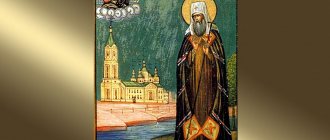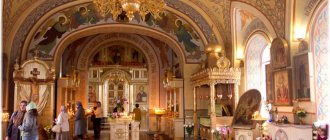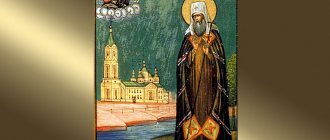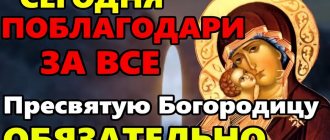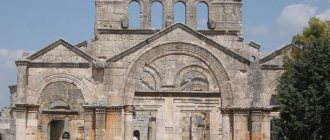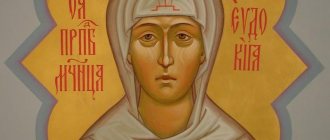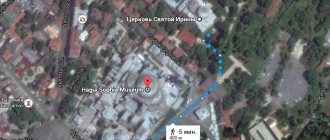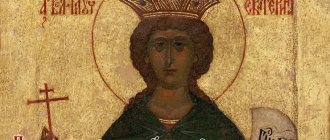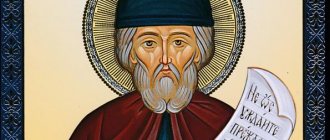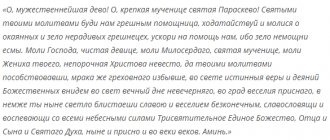Life of Saint Nikita the Stylite of Pereslavl
The Russian Orthodox saint Nikita the Stylite served as a tax collector for Prince Yuri Dolgoruky. He was merciless towards tax payers and used his position for personal enrichment. In 1152, the prince decided to build a new capital of the principality on the shores of Lake Pleshcheevo (Pereslavl Zalessky).
Funds were needed for construction. Nikita began collecting taxes with even greater zeal, not forgetting about his pocket. Ruined by the exorbitant fees, people died of hunger, committed suicide, and became robbers. The name of the tax collector inspired horror in the prince's subjects.
One day, during a service in church, the monk was struck by the words spoken by the priest. This was the saying of the prophet Isaiah about repentance: “... wash yourself and you will be clean...”. His awakened conscience reminded him how many people he had destroyed with his heartlessness.
But, returning home, the tax collector decided to drown out the voice of conscience and invite the guests to a merry feast. He ordered his wife to cook meat for a treat. When the water in the cauldron began to boil, Nikita’s wife saw that human limbs and heads were boiling. In horror, she called her husband. Nikita saw the same terrible picture and realized that the Lord was reminding him of his sins for the second time.
The saint went to the Nikitsky Monastery to repent of his sins. The abbot decided to test how sincere the repentance of the tax collector was. He ordered Nikita to publicly repent of his sins at the entrance to the monastery for 3 days. Nikita humbly did what the abbot said and then disappeared.
It was discovered by a monk who went into the forest to pick mushrooms. The resident saw a half-naked man in the swamp, covered in mosquitoes and midges, covered in blood. He reported what he had seen to the abbot, who went to the swamp to verify the person’s identity. It was Nikita, who thus wished to punish himself for his sins.
The abbot of the monastery believed the repentant sinner, tonsured him as a monk and accepted him into the monastery brethren. With the blessing of the abbot, Nikita dug a narrow and deep well next to the monastery wall, connected to the monastery church by an underground passage.
Nikita left the well for Sunday services through an underground passage. The rest of the days he stood in the well, hung with thirty-kilogram chains with a cross, saying incessant prayers of repentance to the Lord. The well was covered with a lid so that neither sunlight nor moonlight penetrated inside.
The news about the ascetic spread throughout the area. Believers began to come to the well to ask for protection, advice, prayers for healing, and to touch the chains of the stylite. Former drinking buddies, knowing about his wealth, decided that the chains were made of silver. They did not believe in the sincerity of repentance and believed that the former publican was protecting his treasures in this way.
On the night of May 24, 1186, envious people came to the well, killed the stylite and took away the chains. On the shore of the lake, the murderers and robbers discovered that the chains and cross were made of iron, and threw them on the shore of the lake. The next day, the monks discovered Nikita's body, and then the abandoned chains. The saint was buried in the monastery, chains were placed on the coffin.
New in blogs
Since ancient times, Christian ascetic monks and holy fools for Christ's sake wore chains under their clothes on their naked bodies to pacify the flesh and suppress passions. The word “chain” itself is translated from the Old Church Slavonic language as “chain”, but in fact other heavy metal objects could be used: crosses, various plates, rings, large copper icons, iron hats and even shoe soles. Here is how St. Gregory the Theologian wrote about them: “Others exhaust themselves with iron chains, and, thinning their flesh, thinning sin together.” The weight of the verig could reach tens of kilograms.
The ancient ascetics based the feat of faith-bearing on some words of the New Testament, for example, on the words of the Apostle Paul: For I bear the wounds of the Lord Jesus on my body (Gal. 6:17), in order to crucify my flesh with its passions and lusts (Wed: Gal. 5 : 24). In the Epistle to the Romans, the apostle wrote that we are baptized into Christ so that the body of sin may be abolished, so that we will no longer be slaves to sin.
Ancient traditions in Rus'
In Rus', the wearing of chains became widespread among ascetic monks already in the 11th–12th centuries. Reading the Kiev-Pechersk Patericon, we learn that the monks Theodosius († 1074), Mark the Pechernik († about 1102) and John the Long-Suffering († about 1160) wore iron on their bodies. Thus, the Monk Theodosius, while still a youth, “came to a certain blacksmith and ordered him to forge an iron belt, with which he girded himself.”
An ancient legend brought to us information that the founder of the Polotsk Spassky Monastery, the Venerable Euphrosyne, also performed the feat of wearing chains for many years. By the grace of God, in our time the saint's chains were found - iron chains weighing 7 kg. In 1991, they were found in the ancient Church of the Transfiguration of the Savior, and are now kept in the Savior-Euphrosyne Monastery.
Special doing
Wearing chains was a special feat that required spiritual reasoning and the blessing of an experienced confessor, for, as we know, there is no virtue without reasoning. As St. Philaret (Drozdov) wrote, “for ... [faith] there are people, and times, and reasons.” For example, the chains were placed on himself by the Monk Sergius of Radonezh, who by that time had already performed miracles. But for a young monk who is at the very beginning of the ascetic path, for whom the issue of combating passions is more relevant, an experienced confessor is unlikely to bless the wearing of them. This is not a means of achieving holiness, but a tool for suppressing passions, used extremely rarely nowadays.
For the benefit of the soul
The word “veriga” also has a figurative meaning. This is a burden, usually moral or mental. Werigs can be considered as a component of a high and complex culture of self-restraint. Many people, far from the desire for moral improvement, say: “Why do we need prayer work, fasting, patience with insults and the volitional taming of passions - in a word, everything that is contrary to the biological nature of a living being? Why this mockery of yourself? Why languish under the weight of chains? Isn’t it better to go through life joyfully and lightly?”
Let us remember the words of King Solomon from the Song of Songs: “Strong as death is love.” Love in them is not understood as a feeling, as most people think. Love is a force, and the essence of any force is its desire to be expressed in action, in this case - to reorient oneself from caring for the body to caring for the soul, about the eternal soul, about the eternal person. Fasts, vigils, pillars are also a kind of chains. Believing that the soul is more important than the body is a feat. The person who decided to do this put faith at the basis of his life. And it is not at all difficult to wear spiritual “chains” if you know that these are the “weights” of saints, and for us they are an exercise in love.
11.02.2020
Texts of prayers
The akathist to the saint was compiled in the 19th century by the archpriest of the Nikitsky Monastery.
Troparion
In the Orthodox sense, having hated youthful desires and adopted valiant morals, you have defeated the enemy, and in your prudence you have pleased God, and from above you have received from Him the gift of miracles, demons drive away, heal ailments, most glorious Nikita, pray to Christ God to save our souls.
Kontakion
for the sake of Christ from your servants you endured a necessary death / and you received the crown of incorruptibility from Him, / but to those who come with faith from your honest tomb you grant healing, / about the Reverend Nikita, // prayers Tvennich about our souls.
Canon
Irmos: I will open my lips, and they will be filled with the Spirit, and I will vomit a word to the Queen Mother, and I will appear, brightly triumphant, and I will sing, rejoicing, those miracles.
With the light of grace we illuminate, reverend, with faith your memory of the triumphant light-like darkness of sinful darkness, deliver through your prayers, O most glorious Nikita.
Leading the way to God, you walked inappropriately, to the heavenly city, Nikito, you reached it, for the Holy Spirit instructed you, resting in your hearts.
You had exalting humility, Nikito, so we pray to you: be generous, reverend, our humility and ease all illnesses of our hearts.
Theotokos: Joy to us, the Intercessor, for having accepted the fulfillment of the entire Divinity, you appeared, the All-Immaculate One, so all things are to You, - rejoice, - we call with angelic agreement, O God-honored One.
Song 3
Irmos: We do not boast in wisdom, and strength, and wealth, but in You, the Father’s Hypostatic Wisdom, Christ, for there is nothing holy, more than You, the Lover of Mankind.
You changed your former joy for the sake of the good with cruelty, having lived virtuously, blessedly, at a spring in the mountains, like the great Elijah, abiding.
The right path, having desired it for the sake of forgiveness, God showed you with surprise, which you found freely, like a refuge, wise.
Those who are shaken by various passions for your pillar, Nikito, who come, through your honest intercession, visit us all, praying to the Lover of Mankind.
Theotokos: The Wisdom of God, having acquired the all-honorable organ, is embodied from Your pure blood and is shown incorruptibly at Christmas.
Sedalen, voice 5
Having ascended the pillar with your body, and having raised your mind to the worldly level, you add labor to labor, desiring to achieve the blessings prepared for you in heaven, which, having received them, remember us, who honor your sacred memory ́.
Another sedal, voice 4
Like an all-bright star, shining with luminous virtues, God-bearer, you enlightened the whole soul with the Spirit. Thus you passed on to the never-evening Light, resolving the dark clouds of our passions, your memory forever creating righteousness in our hearts.
Glory, and now, the Mother of God
Who can utter my unclean thoughts and the placeless thoughts that overwhelm me, O All-Immaculate One? Who will confess the insistence of my bodiless enemies and their malice? But through Your prayer, O Good One, grant me deliverance for all.
Song 4
Irmos: Seated in glory on the Throne of the Divine in a light cloud, the Divine Jesus came, with an imperishable Hand and those who saved, calling: glory, O Christ, to Thy power.
You yourself betrayed yourself to the pillar, God-bearer, to your fellow citizen with your unshakable soul, foreseeing your future life, even desiring to improve it, like a brave warrior.
Thou hast achieved honorable laurels; wisely, having risen in humility, thou hast humbled the heights of the demons, and in it thou hast stood valor, the glory of the monks and the establishment.
Having armed yourself with prayers and fasting and mortified yourself with fear, the Lord, blessed one, cut off the apostate, the invisible serpent, Father, you were the victor.
Having been kindled by the entire Divine Spirit, Father, you endured your labors for many years, enduring in the stable, seeking the Lord, who strengthens you with Divine grace.
Theotokos: On the throne, terribly sitting on the mother’s hand, the Child was sitting, raising the fallen image and giving deification to beings.
Song 5
Irmos: Everyone was terrified of Your Divine glory: For You, the unartificed Virgin, had in your womb God above all, and You gave birth to the Flightless Son, giving peace to all who sang Your praises yaya.
You walked, reverend, along the narrow path, spreading the divine ascents of the heart and adoring the sacrament, to all things. That is why you were a monk, your lordship.
I have cleared the eye of the mind, reverend, grace is given to you, like a prophet, to foresee and speak of things that are distant and unknown.
Ease my illness from sins and sorrows, and leave my heart free from illness, and grant permission for sins, having a Benefactor God who listens to your honest prayers.
Theotokos: Heal the transformation of my mind, Most Pure One, heal the passions of my soul and the slothful darkness of marriage, as we always please You with praises, All-Immaculate One.
Song 6
Irmos: This divine and all-honorable celebration, God of God, Mother of God, come, let us clasp our hands, from Her we glorify the God who was born.
Thou hast put to death the passions of the body, as if a tree stood high, bearing fruits of miracles, O blessed Nikita.
Even though they were approaching with countless illnesses, they remained weak in body, reverend. Therefore I call you by faith: put away the sickness of my heart.
From spiritual infirmities, Father, who are wavering, who call upon you by faith now, visit us with your prayers, even to God, so that we may piously glorify you.
Theotokos: One Helper, help me who is perishing, and stretch out my hand, and bring me to the refuge of repentance, O Virgin Mary.
Kontakion, tone 8
For the sake of Christ from your servants you endured the necessary death and you received the crown of incorruption from Him, and you grant healing to those who come with faith from your honest tomb, O Reverend Nikita, pray Tvennich about our souls.
Ikos
You were an earthly angel, a heavenly man, like a venerable one, enlightening your soul with fasting and vigil, through hunger and thirst, and by lying on earth you pleased God with all the virtues of monastic life You have corrected this, and therefore we will accept the necessary death from your servants, you have ascended to to the desired Christ, rejoicing, O Reverend Nikita, the prayer book for our souls.
Song 7
Irmos: Having not served the creation of God, more than the Creator, but having bravely overcome the fiery rebuke, I rejoice, singing: O venerable father, Lord and God, blessed art thou.
Having made your heart the Trinity dwelling, three crosses and a heavy iron, Nikito, I carried it on myself, from which the divine grace flows for enlightenment and purification that faithfully flows to you.
Your soul is ever shining with the light of the Divine Spirit, seeing the souls flowing to you with faith, light, blessed, with prophetic prophecies, thereby we please you.
O blessed one, the ailments of those who labor, will soon change and sing with your holy prayers of soul and body: O blessed father, Lord and God, blessed art thou.
Theotokos: Having unfailingly been born, the only God-honored One, by His right hand, Pure One, change my mind to something better, I pray to You, who is sorely transformed by everyday exercises.
Song 8
Irmos: The youths are pious in the cave of Christmas, the Mother of God, then the formed, is the same, now the disabled, all -navigated all the navigable to you, to eat, do it, and extol it in all the beliefs.
Standing on a pillar, like a candlestick, like a luminary, enlightening all the minds of the faithful, you showed good words and deeds the path of the belly and elevated you to the divine meaning to the height of dispassion.
Cleanse your mind with dispassion, you spoke to the Lord Almighty, from the unworthy, ineffable, holy, skillful, you prophetically spoke, enlightening souls, like a great, most blessed prophet; Thus we sing to you according to faith.
Most of my wounds are severe, and the sick often toil, change those, Father, I pray that I have received from God, Nikito, the grace to heal passions and alleviate illnesses.
Trinity: With all the mountains the hosts of the Father and the Son and the Holy Spirit, the Trinity Indivisible, the Uncreated Divinity, hymnically: Holy, Holy, Holy, - let us cry joyfully, - One Power, Beginning lo and the Kingdom.
Theotokos: Who is unapproachable by all, the Creator of the mountains, O Youth, O maiden, who dwelled in Thy womb, keeping Thee infallible and incorruptible after the Nativity. We sing to Him now and again: Sing praise to the Lord’s deeds and exalt Him to all ages.
Song 9
Irmos: Let every earth-born leap, let us be enlightened by the Spirit, let the nature of disembodied minds triumph, honoring the sacred triumph of the Mother of God, and let it cry out: Rejoice, All-Blessed Mother of God, Pure Priest nodevo.
Raising your hands to God, you prayed, strengthening your mind to keep from passions, like an Angel in your body, Father, you were. Therefore, the Angels always live in heaven, standing before the glorious throne, filled with the unevening Light.
As in heaven, in a stable, you lived, reverend: thus you, the wondrous beast, who subdued the passions of the body and evil desires, died, the reverend Nikita. For this reason, we honor you by faith.
Your honest and holy relics, lying in the tomb, are engulfed by illnesses, and crowds of demons always burn, like Nikito, with Divine grace, and exude healing to everyone, truly the blessed ones.
Already approaching God more clearly and purely, remember by faith you, Nikito, who remember, ask for forgiveness of sins for us, and deliverance from all ailments, and the kingdom of God for the village.
Theotokos: Illuminate me with Your Light, Immaculate One, who gave birth to the unapproachable Light, kindling the cloud of passions of my soul, and from darkness, I pray to You, and grant Divine salvation, Pure One, Dina Prisnodeva.
